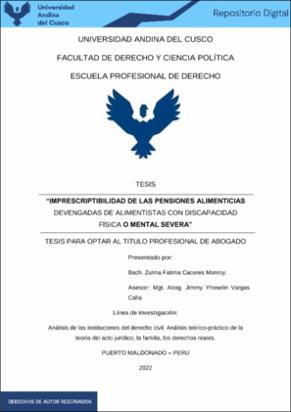| dc.contributor.advisor | Vargas Calla, Jimmy Yhoselin | |
| dc.contributor.author | Caceres Monroy, Zulma Fatima | |
| dc.date.accessioned | 2023-03-27T13:53:53Z | |
| dc.date.available | 2023-03-27T13:53:53Z | |
| dc.date.issued | 2022-11-22 | |
| dc.identifier.uri | https://hdl.handle.net/20.500.12557/5220 | |
| dc.description.abstract | La presente investigación tiene como fin analizar los fundamentos jurídicos para
establecer la Imprescriptibilidad de las pensiones alimenticias devengadas de
alimentistas con discapacidad física o mental severa; considerando que debe primar el
derecho fundamental de los alimentos y el principio de interés superior del niño y
adolescente, puesto que en la vida real pese de haber una sentencia sobre las pensiones
de alimentos, en la mayoría de casos nos encontramos con obligados que no cumplen de
manera puntal su obligación, generando que las pensiones alimenticias se vayan
acumulando, a lo que se conoce como devengados, originando que los representante
legales tengan que solicitar las liquidaciones de pensiones alimenticias devengadas.
Sin embargo, está regulado en el Código Civil, en el artículo 2001°, inciso 5, la figura
jurídica de la prescripción extintiva de la acción que proviene de pensión alimenticia,
generando con ella una desprotección a los alimentistas que se benefician con el
derecho a sus alimentos, por cuanto el plazo establecido de prescripción es de quince
años.
Lo que se busca con esta investigación es la protección al derecho alimentario de los
alimentistas que tienen discapacidad física o mental severa, hijos que no pueden valerse
por sí mismos y que necesitan de por vida de sus alimentos para subsistir, sean
amparados por una norma jurídica que establezca la imprescriptibilidad de la
liquidación de sus pensiones alimenticias devengadas.
Para lo cual se realicé una investigación jurídica de tipo dogmático y por su naturaleza
es cualitativa; se aplicó entrevistas a jueces y abogados obteniendo diferentes
respuestas, de los cuales, el fundamental, es que, tanto del análisis de las normas
jurídicas y de las entrevistas realizadas, se obtuvo que, es necesario la regulación
expresa en el Código de los niños y adolescentes y en el Código Civil, sobre la
Imprescriptibilidad de las pensiones alimenticias devengadas de alimentistas con
discapacidad física o mental severa. | es_PE |
| dc.description.abstract | The purpose of this research is to analyze the legal grounds to establish the
Imprescriptibility of alimony accrued from obligors with severe physical or mental
disabilities; considering that the fundamental right to alimony and the principle of the
best interest of the child and adolescent must prevail, since in real life, despite there
being a ruling on alimony, in most cases we find obligors who do not comply
punctually their obligation, causing alimony to accumulate, to what is known as
accrued, causing the legal representatives to request settlement of accrued alimony.
However, it is regulated in the Civil Code, in article 2001, paragraph 5, the legal figure
of the extinctive prescription of the action that comes from alimony, generating with it a
lack of protection for the obligees who benefit from the right to food, because the
established limitation period is fifteen years.
What is sought with this research is the protection of the right to food of food supporters
who have severe physical or mental disabilities, children who cannot fend for
themselves and who need their food for life to survive, are protected by a legal norm
that establishes the imprescriptibility of the settlement of their accrued alimony.
For which a dogmatic legal investigation was carried out and by its nature it is
qualitative; interviews were applied to judges and lawyers obtaining different answers,
of which, the fundamental one, is that, both from the analysis of the legal norms and
from the interviews carried out, it was obtained that express regulation is necessary in
the Children's Code and adolescents and in the Civil Code, on the Imprescriptibility of
alimony accrued from obligors with severe physical or mental disabilities. | en_US |
| dc.format | application/pdf | es_PE |
| dc.language.iso | spa | es_PE |
| dc.publisher | Universidad Andina del Cusco | es_PE |
| dc.rights | info:eu-repo/semantics/restrictedAccess | es_PE |
| dc.rights.uri | https://creativecommons.org/licenses/by-nc-nd/4.0/ | es_PE |
| dc.subject | Imprescriptibilidad | es_PE |
| dc.subject | Pensión alimenticia | es_PE |
| dc.subject | Devengados | es_PE |
| dc.subject | Discapacidad física o mental | es_PE |
| dc.title | Imprescriptibilidad de las pensiones alimenticias devengadas de alimentistas con discapacidad física o mental severa | es_PE |
| dc.type | info:eu-repo/semantics/bachelorThesis | es_PE |
| thesis.degree.name | Abogada | es_PE |
| thesis.degree.grantor | Universidad Andina del Cusco. Facultad de Derecho y Ciencia Política | es_PE |
| thesis.degree.discipline | Derecho | es_PE |
| dc.publisher.country | PE | es_PE |
| dc.subject.ocde | https://purl.org/pe-repo/ocde/ford#5.05.00 | es_PE |
| renati.advisor.dni | 40079326 | |
| renati.advisor.orcid | https://orcid.org/0000-0002-7458-2766 | es_PE |
| renati.author.dni | 71196743 | |
| renati.discipline | 421016 | es_PE |
| renati.juror | Ochoa Saire, Fredy | |
| renati.juror | Pimentel Elguera, Marcelino | |
| renati.juror | Herrera Angélico, Cristian | |
| renati.juror | Achahui Loayza, Grimaldo | |
| renati.level | https://purl.org/pe-repo/renati/level#tituloProfesional | es_PE |
| renati.type | https://purl.org/pe-repo/renati/type#tesis | es_PE |
| dc.description.lineadeinvestigacion | Análisis de las instituciones del derecho civil. Análisis teórico-práctico de la teoría del acto jurídico, la familia, los derechos reales | es_PE |



